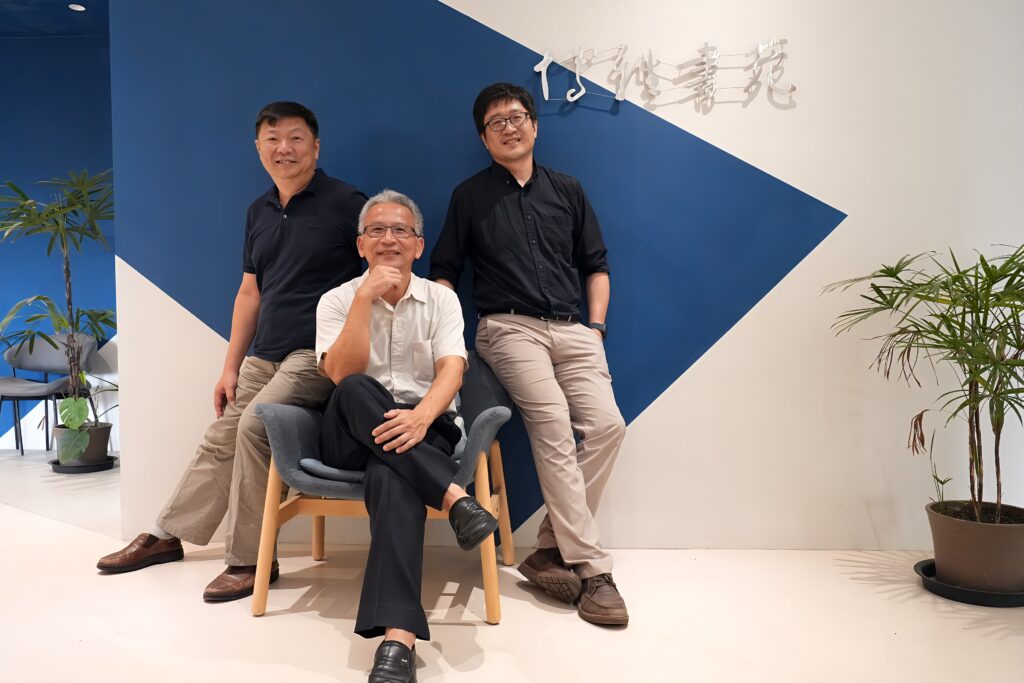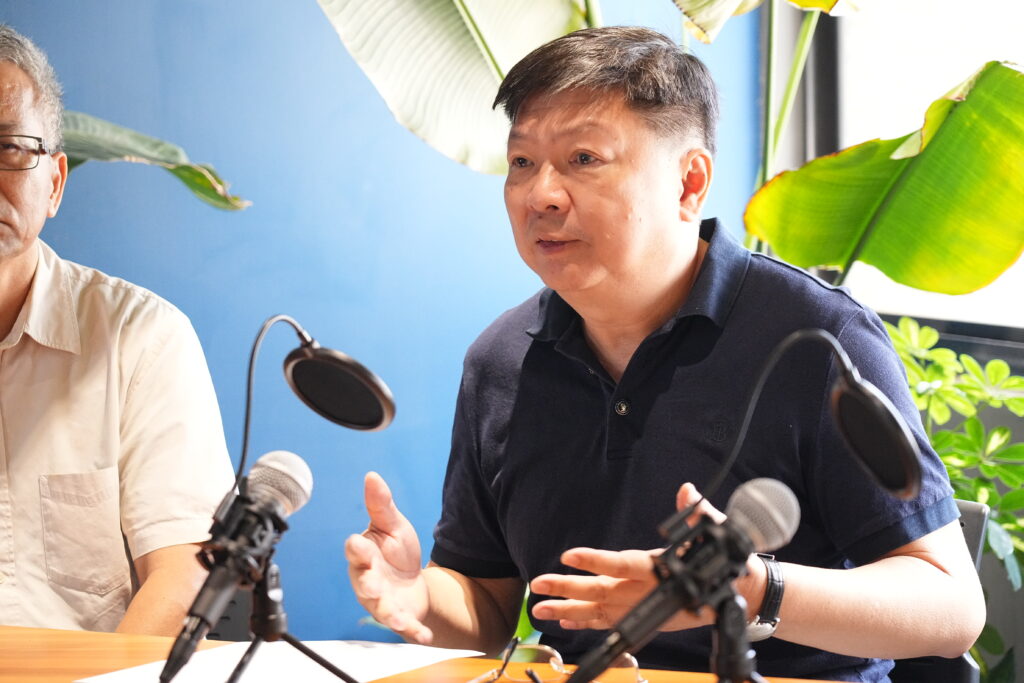
(From left to right: I-Ping Chen, Dean Kuu-Young Young, Li-Hung Chang)
NYCU has long been promoting the spirit of liberal arts education. We established the “NYCU Liberal Arts College”, which integrates various disciplines such as arts, social education, physical education, and general education, to create a holistic education. The Liberal Arts College encourages students to propose and form their own learning communities to achieve the goal of independent learning. Through the organization of courses, it facilitates student to make interactions among their peers, among different campuses, across institutions, and even over the world. The College helps students engage in interdisciplinary learning beyond their undergraduate majors, enabling them to interact with individuals from different cultural and professional backgrounds. This way of learning fulfills the SDGs goals of education, while dispels misconceptions about general education as “undervalued” or “easy” courses.
Professional education, and more…
The Mandarin title of the Liberal Arts College, “Po-Ya” (博雅), refers to holistic education that values humanistic principles and aims to cultivate individuals with “interdisciplinary knowledge.” Since the merger in 2021, NYCU has taken steps to integrate the arts center, social education center, physical education center, and general education center of both campuses to establish the “NYCU Liberal Arts College”, which is dedicated to promoting liberal arts education.
The educational approach of the Liberal Arts College emphasizes several directions in education: interaction and communication among students, practical experiences of students within communities, connecting students internationally, as well as interdisciplinary learning outside of students’ specialized fields. Therefore, planning general education courses has become one of the crucial missions of the Liberal Arts College.

Joint Programs Among Different Campuses to Boost Interactions of Students
In addition to providing essential courses, the Liberal Arts College aims to encourage student interaction through cross-campus course arrangements, providing opportunities for students from different majors to connect.
During the course planning, it has come to the College’s attention that in the curriculum of many departments on the Yang Ming campus, most general education courses concentrated in the first year due to the fact that students have their National Examinations in later academic years; on the other hand, curriculum of general education in departments on the Chiao Tung campus, are dispersed in different academic years. Liberal Arts College thus hopes to bridge the gap in terms of time and space, allowing students from different majors to interact. Take the course “Building Character through Examples”, taught by Professor Yi-Bing Lin and former Vice President of Yang-Ming University, Jen-Chuen Hsieh, as an example: the course was scheduled to be held in the evening to coordinate with shuttle services, while incorporating diverse reading materials, discussions, and lectures into the syllabus. This arrangement attracted over four hundred students competing to enroll.

Cross-campus Collaboration Inspires a Diversity of Perspectives
According to Deputy Dean Li-Hung Chang, the Liberal Arts College actively collaborates with other institutions and various units, inviting different perspectives and expertise. For instance, the course ” Cross-Disciplinary GE Course: Things We Learned from Animals,” is an interdisciplinary general education course, under the collaboration of NYCU, National Chengchi University, and National Taipei University of Arts. It approaches the subject from various perspectives, including science, life sciences, medicine, psychology, literature, philosophy, humanities, and performing arts, to explore the interdependence between humans and animals, and examine issues related to “post-human” and the “anthropocene.” Through this course, more students became interested in animals in their daily lives, such as the stray cats and dogs on campus, while gaining an understanding of the challenges animals face for survival.
The Liberal Arts College also encourages students to plan activities based on their interests and organize self-driven learning communities. For example, in the “Liberal Arts College Active Learning” project initiated by the Community and Peer Education Center of the Liberal Arts College, the “Tai-Gi” team, composed of students from various departments including Arete Honors Program, Electronics and Electrical Engineering, Biological Science, Physical Therapy and Assistive Technology, and Medical Science program. The team uses visual media to document Taiwanese culture and the Taiwanese language. They utilize the power of community to promote their findings and their project were recognized to actively contribute to SDGs goals such as Quality Education (SDG 4) and Multiculturalism (SDG 17). The team received the Global Youth Action Award from the Youth Development Administration, Ministry of Education in 2022.

Combination of Humanities and Technology Connects Taiwan to the World
Dean of the Liberal Arts College, Kuu-Young Young, talked about the developments of the college, “The current focus is primarily on technology, but the next step will be discussions related to humanities.” Theoretical AI courses are a strength of NYCU and are the main subjects for many students. The impact of AI on the humanities will be a future focus, and the university has actively introduced AI and humanities courses to provide students with an avenue to learn about ethical considerations in technology, beyond their chosen fields.
As Internet breaks down national boundaries, students also have more opportunity to directly interact with people from around the world during classes. Courses such as “Global Im/mobilities: Borders, Migration, and Identity: A Taiwan-US Global Classroom” and “Homemaking and Space Justice: A Taiwan-US Global Classroom,” led by Professor Tsai-Hsuan Ku, connect with students from foreign countries via the internet. These courses bring students, teachers, and community members from diverse geographical, social, cultural, and racial backgrounds together, creating a rich and diverse learning environment. Many students have shared that through these courses, they’ve learned how to confidently express their own opinions and broaden their cross-cultural perspectives.

“Xiū-Yuǎn (脩遠) Program” Foster Healthy Intercollegiate competition; “Course Proposal Program” Supports Independent Learning
Deputy Dean of the Liberal Arts College, I-Ping Chen, revealed that the upcoming “Xiū-Yuǎn (脩遠) Program” will involve various colleges in planning general education courses that can be taken by students from other colleges. Through the exchange of the “best teachers and courses” from different colleges, the aim is to make general education a hub that inspires students to engage in interdisciplinary learning and enhances their motivation to study in the general education field.
Dean Kuu-Young Young and Deputy Dean I-Ping Chen of the College compare the course offerings to a “self-service buffet,” hoping to provide a “nutritious balance” of courses within the Liberal Arts College. The aim is to meet the needs of students from various professional fields, allowing them to find the courses they desire. The College is also developing a system that can enable students to autonomously “order from the menu,” where students propose courses according to their learning needs. If certain criteria are met, the Liberal Arts College will assist the students in arranging the courses. This approach has sparked active inquiries and discussions among students, allowing them to exercise their independent learning spirit through a flipped course design.
